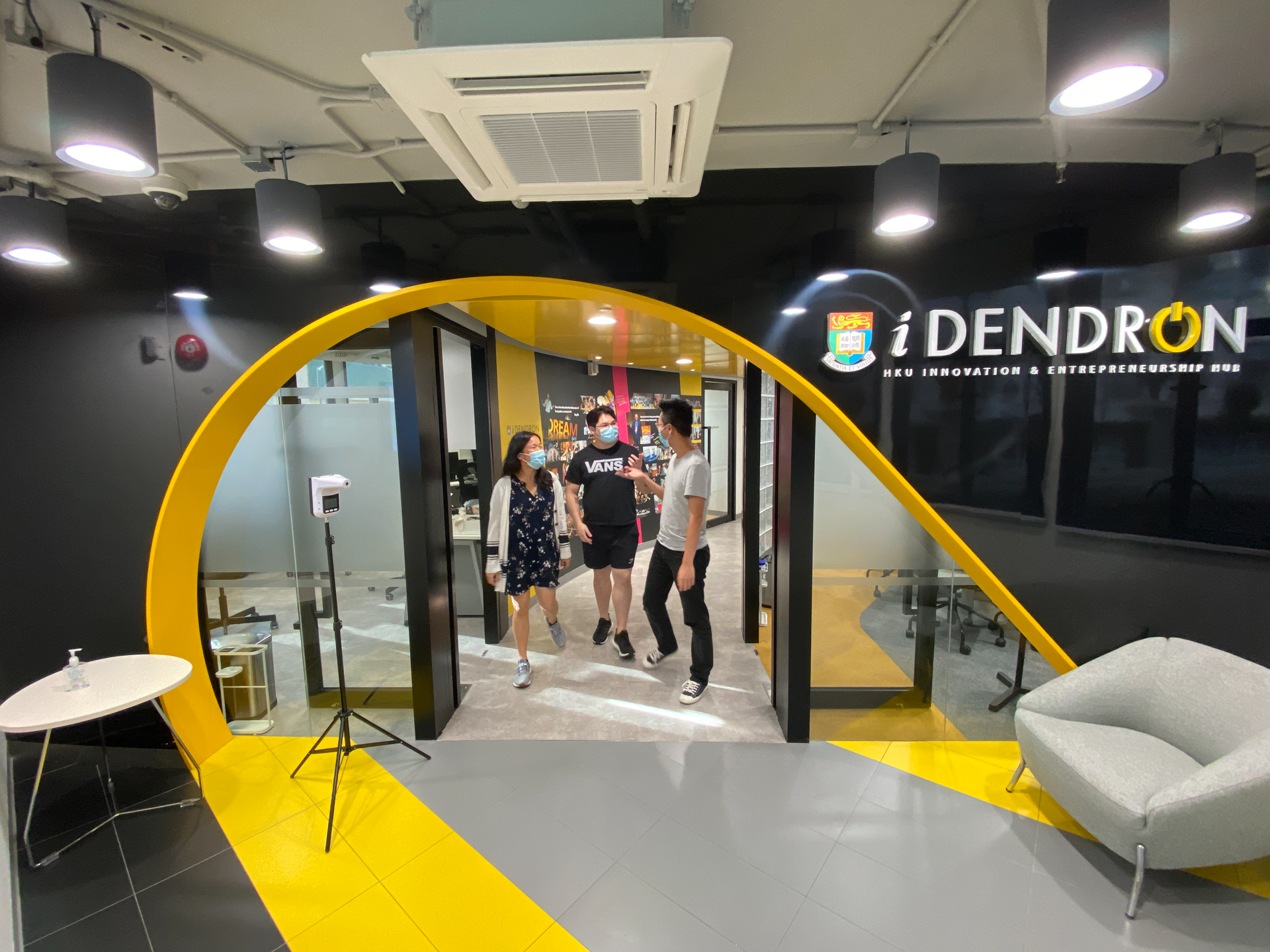


Aiming to engage and grow the entrepreneurship community, iDendron has been striving to establish interdisciplinary cooperation on entrepreneurial initiatives, and support and incubate start-ups with a series of workshops.
Knowledge Exchange and Technology Transfer
Growing Our Impact
Getting the fruits of our research into the community is a central goal of the University, which aims to be an innovation hub for Hong Kong, the Greater Bay Area (GBA) and beyond. Over the past two years, we have streamlined operations at our Technology Transfer Office (TTO) and developed facilities that promote innovation, to enhance and advance our scholars’ ability to translate their research into impact. Patent applications and commercialisation activities all increased significantly in 2020–21, as we continued to expand our footprint and bring our innovations out into the world.
More Groundbreaking Inventions Disclosed
There was a welcome surge in activity related to innovation over the past year. The TTO handled 130 new inventions as disclosed to the University by our scholars, up 54.5% from 2019–20, and received 212 patent applications, up 57% from the previous year. Some of our researchers’ most promising inventions were honoured at the 2021 Inventions Geneva Evaluation Days – Virtual Event, where HKU won 11 gold and silver awards for contributions from engineering, medical science and architecture, and a Gold Medal with Congratulations of the Jury for a nasal flu vaccine (see COVID-19 Expertise: From the Lab to the Community).
The University’s research impacts are expected to increase exponentially in the near future through the cutting-edge medical, engineering and science laboratories launched under the InnoHK initiative, which collectively have received more than HK$3 billion in funding (see Research and Innovation). TTO has played a major facilitating role in recruiting staff, setting up companies for each of the nine projects, and overseeing the establishment of 100,000 square feet of laboratory space at the Hong Kong Science and Technology Park, which was gradually being occupied by scientists starting from May 2021.
Innovation and knowledge exchange activities are also bringing greater tangible benefits to the University, generating HK$18.28 million in income in 2020–21, up from HK$10.85 million in 2019–20.
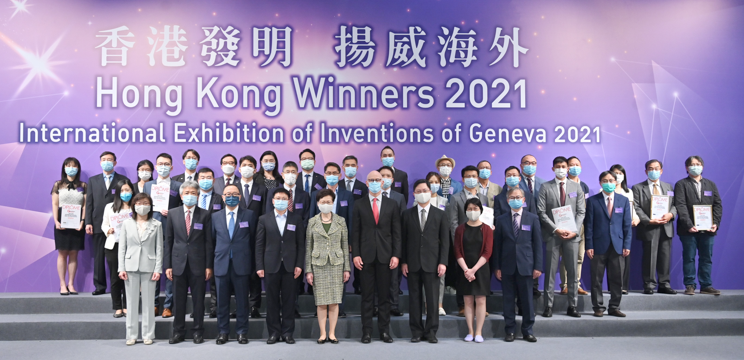
HKU awardees at the Chief Executive’s Reception for Awardees of International Exhibition of Inventions of Geneva 2021.
Boosting Our Support to Innovators
These developments take us in the right direction, but to fully realise the potential of our research findings, we need to strengthen and advance the University’s ability to commercialise and disseminate our innovations. Progress is also being made on this imperative.
First, we revamped funding to provide more meaningful support for start-ups and impact projects. The Technology Start-up Support Scheme for Universities at HKU (TSSSU@HKU) previously awarded HK$8 million to 24 start-up teams. Now, HK$5 million is set aside as Grand Awards for the best five teams, which receive HK$1 million each, while HK$3 million is earmarked as Seed Fund Awards for 12 to 15 teams with good potential to grow their inventions. In 2020–21, a total of 17 teams were awarded under the TSSSU@HKU. The HKU Impact Project Funding Scheme also increased its award for each project from HK$100,000 to HK$150,000 and supported 58 projects in 2020–21.
Second, procedures for filing patent applications and the like have been streamlined to make it easier and faster for researchers to work towards commercialising their research. TTO has also established internal teams focussed on business development, legal issues, communications and marketing, to provide a complete service package to researchers.
Third, to provide scholars and potential external partners with more information and networks, we have stepped up our outreach with two new initiatives. The Technology Transfer Primer series features regular webinars with participants from industry, the HKU community and government departments, while the monthly TTO e-newsletter TechXfer (circulation: 30,000) covers topics such as HKU technology and how TTO facilitates researchers.
Finally, the University formally recognised innovation in the HKU Excellence Awards, which for the first time included new categories for best HKU Innovator and best HKU Young Innovator (see The Innovators).
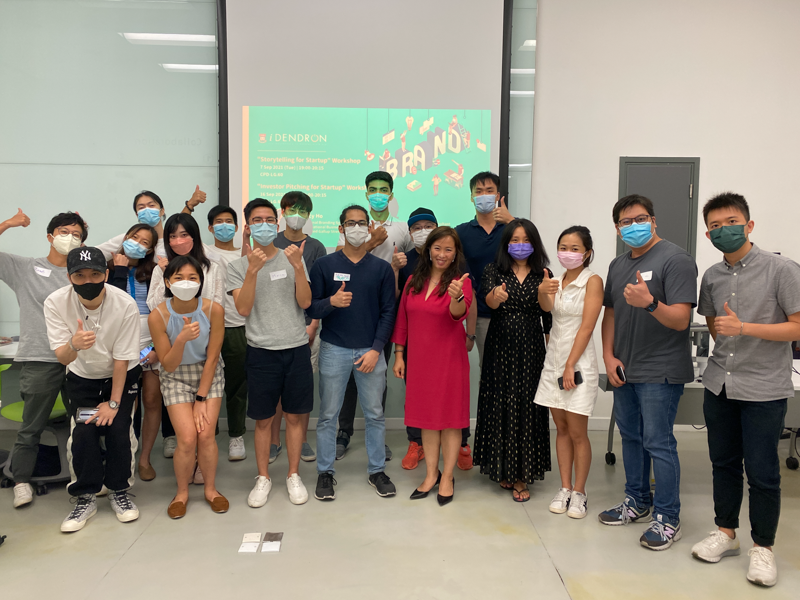
iDendron’s SEED programme supports early-stage start-up projects initiated by HKU students, alumni and staff with co-working spaces, training, supportive network and seed funding up to HK$100,000. The above picture shows participants in the storytelling and investor pitching workshop.
Giving a Leg Up to Young Innovators
Young talent is critical to the future success of an innovation society, so we have developed the iDendron programme to help budding innovators and entrepreneurs realise their dreams. iDendron provides training and other support for students and recent graduates. In 2020–21, its six-month Incubation Programme for a select 20 HKU start-ups saw a 400% increase in applications. It also trained more than 500 HKU members and friends through the Entrepreneurship Academy and hosted more than 20 Founders Meetups (a new initiative).
iDendron also provides financial support through the SEED programme, which it operates with the Hong Kong Science and Technology Park and AWS Cloud Services. In 2020–21, that programme received applications from 120 teams and awarded HK$100,000 to 20 of them. In 2021 iDendron was also named Grantee of the ‘Funding Scheme for Youth Entrepreneurship in the Guangdong-Hong Kong-Macau GBA’, which will award winning teams up to HK$600,000 seed funding and other support.
On the Horizon
These foundations were augmented with the expertise of a former technology transfer advisor of the Massachusetts Institute of Technology, who was recruited as advisor to the TTO in 2021. The University is also striving to capitalise on burgeoning developments in the GBA. This will be strengthened when the newly announced Shenzhen campus opens its doors in the next few years. The vast and unquenched demand for deep tech innovations and application of those innovations holds promise of unprecedented opportunities for years to come.
110
Patents
100
+
start-ups
58
KE projects
HK$18.28 million
income generated by innovation and knowledge exchange activities in 2020–21.
COVID-19 EXPERTISE: FROM THE LAB TO THE COMMUNITY
HKU’s world-leading research on emerging infectious diseases has come to the forefront during the COVID-19 pandemic, when our scholars were among the first to alert the world to the scale and nature of the virus. Recent research has focussed on containing the virus and protecting the population.
Detecting COVID-19 through Sewage
Staying ahead of COVID-19 outbreaks has been a challenge around the world. But a method devised by a cross-disciplinary team led by Professor Zhang Tong in the Department of Civil Engineering is giving governments a fighting chance.
Working with colleagues in the School of Public Health, Professor Zhang developed technology that can detect the SARS-CoV-2 virus and its variants in sewage samples. It was first used in Hong Kong and proved instrumental in preventing large community outbreaks by detecting hidden carriers.
The process was developed over summer 2020 and became incorporated into the government’s control strategy for COVID-19 in December, with compulsory testing ordered for areas or buildings with positive sewage testing results. By June 2021, more than 50 silent carriers had been found and their hidden transmission chains stopped. The routine sewage monitoring system now covers over 110 stationary sampling sites in Hong Kong and can detect early warning signals of COVID-19 re-emergence from among a population of more than 5.4 million people.
The team continued to develop the process and in June successfully identified the Delta variant in Hong Kong sewage. Their sewage-testing tool won a Gold Medal at the Special Edition 2021 Inventions Geneva Evaluation Days. “Sewage may tell the health of a city, and we are learning how to listen to it,” Professor Zhang said.
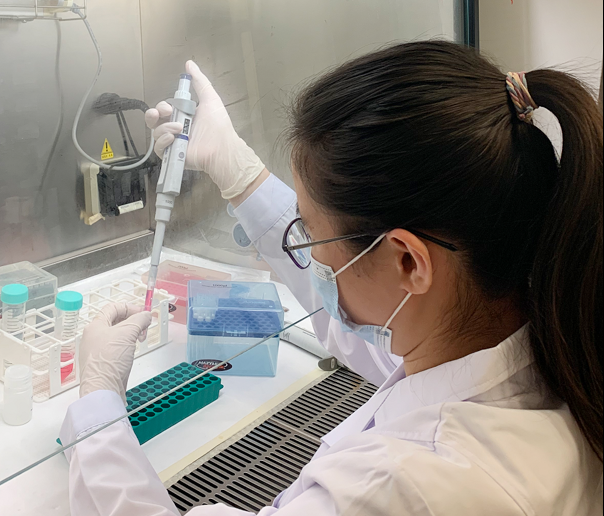
The testing method invented by Professor Zhang Tong’s team targets different mutations of the spike protein of SARS-CoV-2 and can detect and quantify SARS-CoV-2 variants with high specificity in the sewage sample within a few hours.
Pioneering Nasal Vaccine Undergoes Clinical Trials
Professor Chen Honglin and his team in the Li Ka Shing Faculty of Medicine developed a nasal-spray COVID-19 vaccine that was the first of its kind to enter a human clinical trial and won the Gold Medal with Congratulations of the Jury at the Special Edition 2021 Inventions Geneva Evaluation Days.
The nasal spray delivers the vaccine to the upper respiratory tract, which is the first line of immunity for infections. It is based on technology used to manufacture influenza vaccines, with tweaking by Professor Chen to adapt it to a coronavirus. It can be produced by any influenza vaccine manufacturer, does not require special handling, and can be applied to people of all ages. It is also effective against the major variants of the SARS-CoV-2 virus that causes COVID-19.
The vaccine has been developed in partnership with Xiamen University and Beijing Wantai Biological Pharmacy Enterprise Co. Ltd. and received two stages of funding (US$0.62 million + US$4.8 million) from the international Coalition for Epidemic Preparedness Innovations and a HK$20 million grant from the Hong Kong Government’s Health and Medical Research Fund to be used towards clinical trials to determine the efficacy and safety of the vaccine. The first of these was launched in Mainland China in September 2020 and in Hong Kong in March 2021. The results so far have been highly promising and Phase 3 clinical trials have been planned and were due to start before the end of 2021. “We hope this vaccine can be used to boost the immunity in the upper respiratory tract to reduce transmission in coming endemics of SARS-CoV-2,” Professor Chen said.
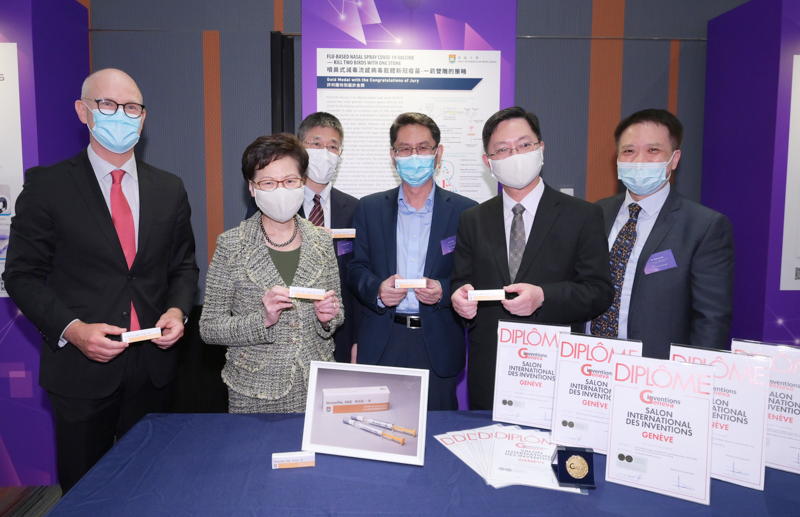
The nasal-spray COVID-19 vaccine developed by Professor Chen Honglin (third from left) and his team won the Gold Medal with Congratulations of the Jury at the Special Edition 2021 Inventions Geneva Evaluation Days.
Community Outreach that Goes Both Ways
The Li Ka Shing Faculty of Medicine (HKUMed) began operating a Community Vaccination Centre in 2021 where it administers the COVID-19 mRNA Vaccine: Comirnaty (BNT 162b2) from Fosun Pharma / BioNTech. The centre initially operated at Ap Lei Chau Sports Centre and switched to HKUMed affiliate Gleneagles Hospital in October 2021. As of the end of October, 147,000 vaccine injections had been administered through these outlets.
In addition to this contribution to the community, HKUMed is also recruiting volunteers from its own and other vaccination centres for further research on COVID-19. Among the studies underway are a longitudinal study that follows volunteers for up to three years after vaccination to monitor their immunity over time; a study on the vaccination of adolescents and children; an investigation of the effects of combining mRNA and inactivated COVID-19 vaccines; and the testing of a booster shot.
HKUMed has also been at the forefront in advising senior policymakers and sharing solid science-based knowledge with the community since the earliest days of the pandemic. This outreach has helped shape the government’s and public’s response to the threat and was honoured by a 2020 Faculty Knowledge Exchange Award, which was bestowed on Professor Keiji Fukuda and his team.
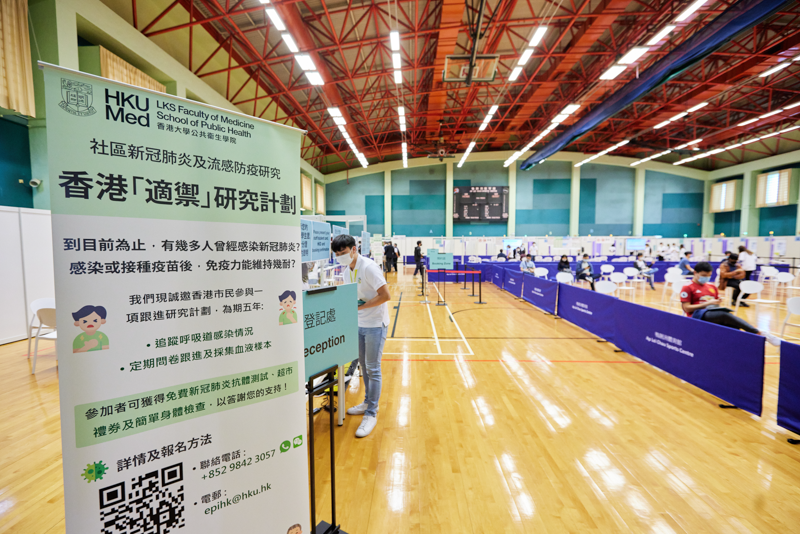
HKUMed operated the Community Vaccination Centre at Ap Lei Chau Sports Centre from March to September 2021 and started operating the HKU Community Vaccination Centre at Gleneagles Hospital from October 2021 onwards.
THE INNOVATORS
Scholars who have been pushing at boundaries were honoured in the University’s annual Excellence Awards, which for the first time included Innovator and Young Innovator Awards for researchers who develop inventions with high potential impact.
HKU Innovator Award
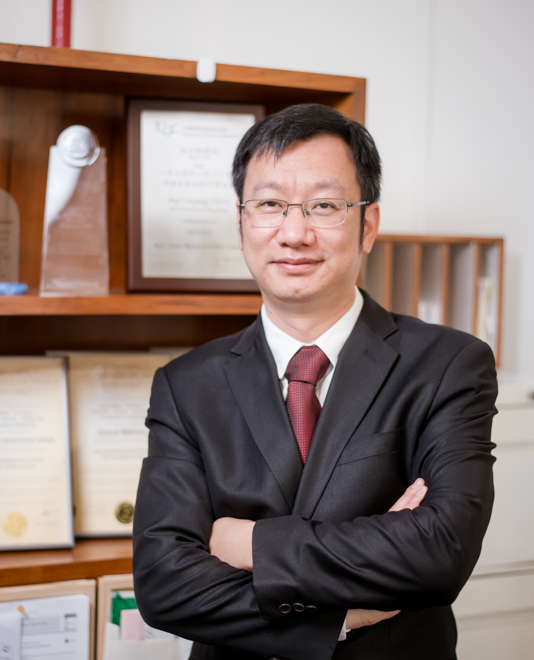
Professor Tang Chuyang
Department of Civil Engineering
Cheap, Efficient Air and Water Filters to Protect Health
Professor Tang Chuyang of the Department of Civil Engineering is the first recipient of the HKU Innovator Award, which was awarded in March 2021. He was honoured for his work in developing filter and membrane materials that remove harmful pollutants from water and air and are highly efficient and environmentally sustainable.
Professor Tang’s patented water filter, for example, is super-permeable and operates on gravity so there is no need for electricity and chemicals, making it ideal for emergencies and disaster relief. The filter can instantly and nearly completely remove heavy metals, bacteria and many other contaminants from water, and can be fitted into compact portable devices, such as foldable cups and jugs. “After an earthquake or tsunami, there is often no reliable supply of clean water nor electricity. Our filter can deliver safe drinkable water in less than one minute – it is simple and reliable,” he said.
Professor Tang has also developed a patented nanofibrous filter for use in reusable face masks in the wake of COVID-19, which removes a higher quantity of particulates compared with existing face masks.
HKU Young Innovator Award
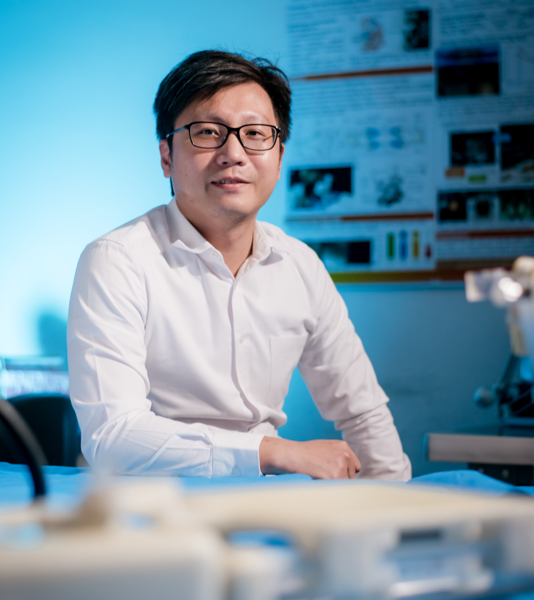
Dr Kwok Ka-wai
Department of Mechanical Engineering
High-performance Mechanical Transmission for the Next Generation of Surgical Robots
Dr Kwok Ka-wai of the Department of Mechanical Engineering has won the first HKU Young Innovator Award for his pioneering work on high-performance mechanical transmission applied to surgical robotics used in magnetic resonance imaging (MRI). The award honours scientists aged below 40.
Dr Kwok’s innovation has been to overcome the challenges of surgery taking place over extended distances and within demanding environments such as the strong magnetic field of MRI machines, or through flexible endoscopic devices. He worked closely with medical doctors and industrial partners to develop robotic systems made of non-metal and specialised materials that run on hydraulic and / or wire-driven transmission. The robots are designed to be very precise in their positioning – something that is of paramount importance in surgery.
“My research opens up a new dimension with new eyes to see through the body and organs and pinpoint specific sites for safer, more accurate and more effective positioning for robotic surgery,” he said. The robots can be operated from the MRI control room at a distance of 10 metres.
Dr Kwok has built on his initial innovation to develop multiple ‘world-first’ prototypes for MRI-guided robots for intra-cardiac catherisation and bilateral stereotactic brain surgery and has received awards from international robotics societies and strong interest from industry. His work also extends to endoscopic surgery, where he has developed tiny robotic instruments that can manoeuvre within an endoscope tunnel that is less than 2.8 millimetres wide.
Knowledge Exchange Excellence Award
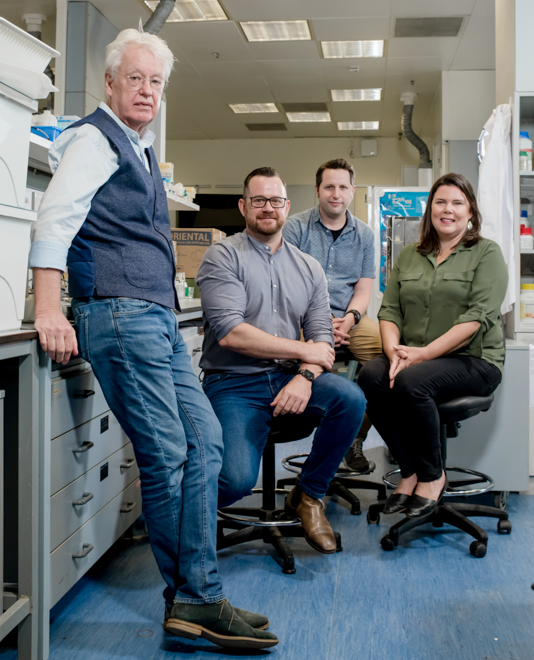
Dr Caroline Dingle
(first from right)
Dr David Baker
(second from left)
Dr Timothy Bonebrake
(second from right)
Professor David Dudgeon
(first from left)
School of Biological Sciences
Conservation Forensics Target Illegal Wildlife Trade
A team from the School of Biological Sciences won the HKU Knowledge Exchange Excellence Award for their contributions in helping track and prosecute illegal wildlife traders and increase protection for endangered animals. Using conservation forensics techniques such as barcoding, genomics, diet analysis, population genetics and trade network analysis, Dr Caroline Dingle, Dr David Baker, Dr Timothy Bonebrake and Professor David Dudgeon have helped uncover extensive criminal activities and supported successful prosecutions by providing authorities with accurate scientific data.
For example, they developed applied stable isotope techniques to determine whether yellow-crested cockatoos available through the pet trade were bred in captivity or wild-caught – important work given there are fewer than 2,500 in the wild. The team’s work has also been used to increase protection of turtles, pangolins and fish under the Convention on International Trade in Endangered Species of Wild Fauna and Flora (CITES) and International Union for Conservation of Nature (IUCN), the main bodies overseeing conservation of endangered flora and fauna.
“We came together as a result of observations we were all having of the diversity of species in trade in source countries and here in Hong Kong. We realised we had an opportunity here to use our skillset to contribute evidence that would help combat this illegal trade,” Dr Dingle said.
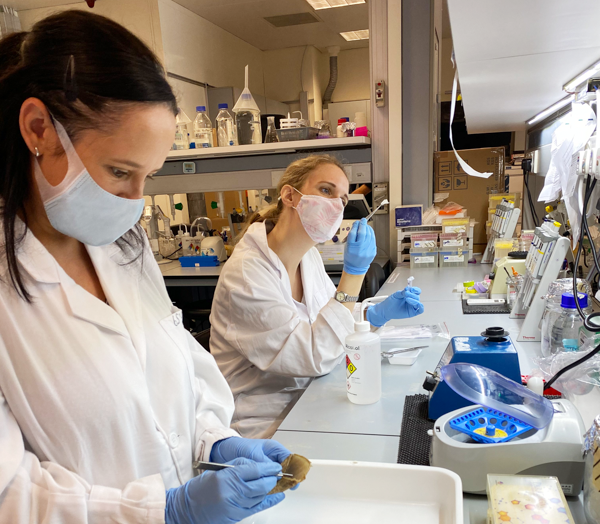
Members of the Conservation Forensics Lab, Ms Tracey Prigge (left) and Dr Astrid Andersson (right), processing samples for genetic analysis.
CHANGE FOR THE BETTER
HKU’s impact extends beyond medicine, engineering and science as scholars have applied their research and expertise to improve the environment and the social and personal aspects of people’s lives.
Sustainability Project Wins UNESCO Award
The HSBC Rural Sustainability Programme operated by HKU’s Policy for Sustainability Lab was a recipient of the inaugural Special Recognition for Sustainable Development category at the 2020 UNESCO Asia-Pacific Awards for Cultural Heritage Conservation.
The traditional Hakka village of Lai Chi Wo has been settled for more than 400 years but in recent decades, villagers have migrated or moved to the city and the farming land has lain fallow. The programme was launched by the Lab in 2013 to rehabilitate agriculture and revitalise the village community and culture in an environmentally sustainable manner. This has also involved reaching out to the wider Hong Kong community and raising awareness of the village’s resources and heritage. For example, a virtual festival held in February 2021 focussed on locally grown coffee beans to help urban people understand the value of local farming and its connection with ecological sustainability using an everyday product they are familiar with.
Only two winners were selected from 48 entries from nine countries in the UNESCO awards. The jury applauded the Lai Chi Wo project’s approach and said it “upholds the key dimensions of sustainable development – economic, social and environmental – in understanding the holistic rejuvenation of the historic Hakka agricultural settlement using nature-based solutions.”
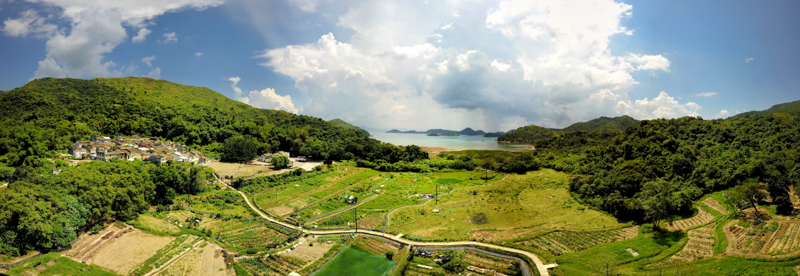
The HSBC Rural Sustainability Programme was selected as one of two winners of the inaugural Special Recognition for Sustainable Development at the 2020 UNESCO Asia-Pacific Awards for Cultural Heritage Conservation, out of 48 entries from nine countries in the Asia-Pacific region.
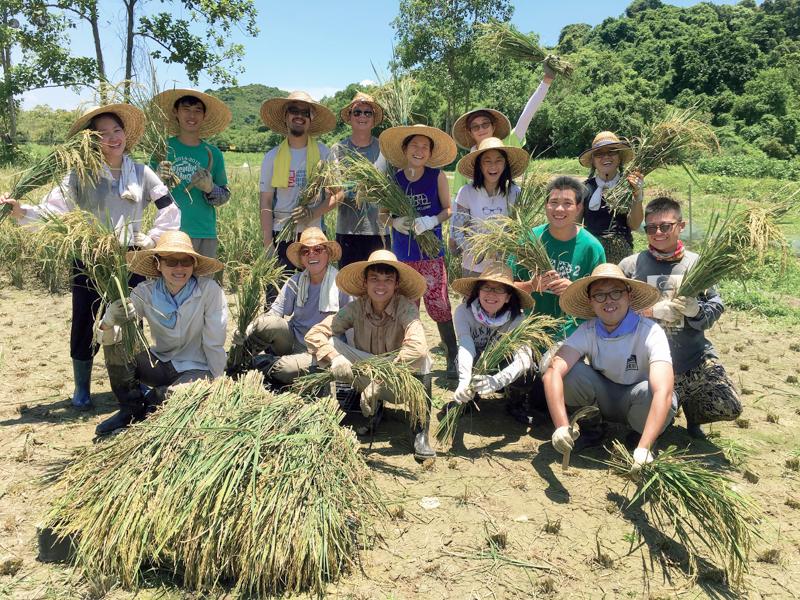
The current Lai Chi Wo community is formed of indigenous villagers, newly settled farmers and volunteers. Different community groups and individual citizens outside the village were engaged in the HSBC Rural Sustainability Programme. They contribute to the adaptive creation of a landscape that ensures a cultural continuum and a respect for spirit of the place.
Recognition for Programme to Support Autistic Children
The Faculty of Social Sciences has been working with the JC A-Connect: Jockey Club Autism Support Network to enhance support for children with autism spectrum disorder (ASD) and their families and schools, including training key stakeholders and raising public awareness and acceptance. In 2021, the Network’s approach with schools was adopted by the Education Bureau, which provided an additional HK$62 million per year for small group training of students with ASD in mainstream schools.
This approach is based on collaboration between schools and non-government organisations. It has been implemented in 510 primary and secondary schools, reaching 6,800 students – or about 55% of all ASD students in mainstream schools – and provided well over 90,000 hours of training in schools and more than 35 training seminars for teachers and NGO team leaders. The Network has also worked with paediatricians, clinical psychologists, social workers, educators, parents, young people with ASD and community partners to develop teaching aids and employment opportunities; provided training for caregivers; and organised more than 20 public education events for nearly 17,000 people.
Dr Kathy Wong of the Department of Psychology leads the project’s school support team and Dr Paul Wong Wai-ching of the Department of Social Work and Social Administration leads the family support team. “The programme has produced positive outcomes – students’ communication skills, emotional control, executive functioning and problem solving have been shown to improve. Parents also report improved relationships and behaviour of their children, and teachers have better understanding and more confidence in understanding their students’ needs and problems and managing them,” Dr Kathy Wong said.
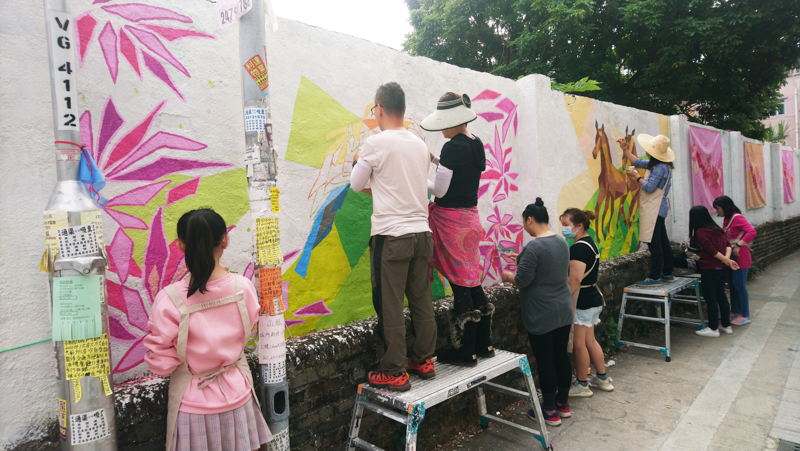
The mural co-creation activity in Kam Tin provided children with autism spectrum disorder the opportunity to showcase their talents.
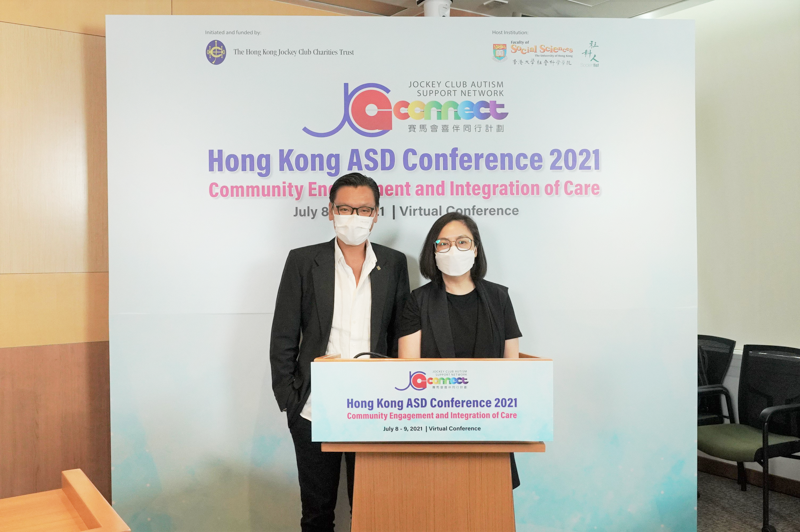
Dr Kathy Wong (right) and Dr Paul Wong (left) shared the latest research findings and good practices in supporting the autism spectrum disorder (ASD) community in the Hong Kong ASD Conference 2021.
Early Intervention Gives Non-Chinese Speakers a Better Start
Hong Kong’s ethnic minorities have a poverty rate that is twice that of the general population. A key factor is the inadequacy of their Chinese-language abilities. A programme in the Faculty of Education is addressing the problem by targeting very young children through language programmes and training of teachers.
The ‘Start from the Beginning – Chinese Supporting Scheme for Non-Chinese Speaking (NCS) Students in Kindergarten’ was started with six seed schools in 2015, led by Dr Elizabeth Loh Ka-yee of HKU and her collaborator Dr Tikky To-Chan Sing-pui of the Education University of Hong Kong. It now operates in 52 schools, providing a curriculum, teaching materials, small group and individual training for students, teacher training, workshops and an assessment tool. Language proficiency tests show that it is significantly narrowing the gap between Chinese and NCS students.
The impact of the programme recently helped it attract strong funding support. It received HK$26 million as the first recipient in Hong Kong of the Pay-for-Success fund, in which funders provide money upfront for social programmes and are reimbursed by the government if targets are met or exceeded, as well as HK$18 million from Bank of China (Hong Kong)’s BOCHK Centenary Charity Programme. Together, these donations will help extend the reach of the Start from the Beginning programme to nearly 100 schools by 2023.
“NCS students not only need good Chinese language proficiency, they need to perform as well as their Chinese counterparts. The bar is much higher than just learning Chinese language itself,” Dr Loh said.
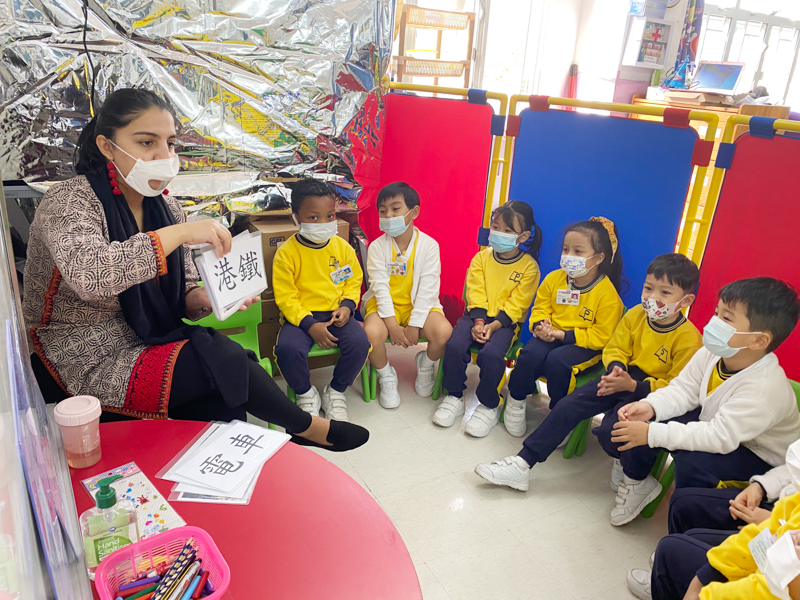
Ms Hina Butt (left), Curriculum Officer, is providing Chinese language enrichment classes to non-Chinese speaking students using a Dynamic Enrichment Learning Mode at one of the seed schools, Pristine Kindergarten.
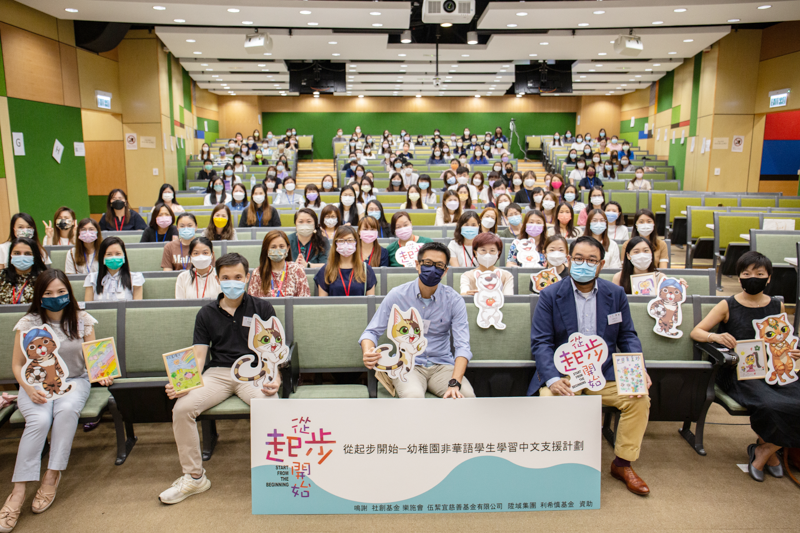
Participating schools shared their experience, outcomes and gains from the project in a sharing session organised in July 2021.